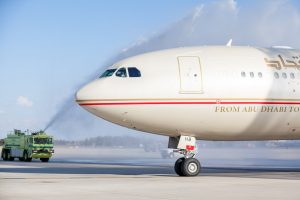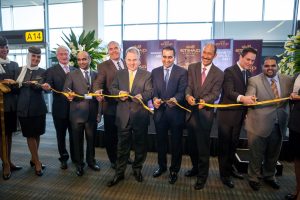Etihad Airways, the national carrier of the United Arab Emirates (UAE), has inaugurated non-stop daily flights between Abu Dhabi and Washington, D.C., creating the first direct air link between the two capitals. This is the carrier's fourth destination in North America after New York, Chicago and Toronto and it has carried almost two million passengers on these routes, achieving a 12.6 per cent growth in traffic last year.

The new service, launched on March 31, 2013 to Washington Dulles International Airport has been introduced to meet strong demand for government and business travel, as well as growing demand for leisure trips between and beyond the cities. It is being operated using an ultra-long-range Airbus A340-500 seating 240 passengers in a three-class cabin – 12 in Diamond First, 28 in Pearl Business and 200 in Coral Economy Class and will be a 15 hour block sector on the leg to Washington.
“Government and corporate customers in both markets have given us strong indication that the Abu Dhabi - Washington route can support a daily service from day one,” said James Hogan, President and Chief Executive Officer, Etihad Airways. “We have confidently responded by committing 3,360 seats per week and already our forward bookings on the route are very encouraging in both directions.”
The airline has reinforced its commitment to the main international gateway into the US capital by opening a US$6.8 million premium lounge this week in Terminal A at Dulles Airport for use by its Diamond First and Pearl Business Class passengers.
The arrival of Etihad is just one of a number of key new routes that will be introduced at Washington’s Airports this year and follows an excellent performance in 2012 when record traffic levels were reached. Official data from the airport operator reveal 42.2 million passengers traveled through Washington’s Airports in 2012, including 6.7 million international passengers at Dulles.
“Dulles continues to lead the way as the region’s premier international gateway,” said Jack Potter, President and Chief Executive Officer, Metropolitan Washington Airports Authority. “Overall, Washington’s airports grew in passenger service during 2012. This puts us in a very good position for continued success going forward at Reagan National and Dulles International.”

International passenger travel grew by two per cent at Dulles during 2012, the ninth consecutive year of growth since 2003. Increased air routes during the year added 70 more international flights per week and included the arrival of new airlines such as Porter Airlines, Aeromexico and Emirates Airline, serving Toronto, Mexico City and Dubai, United Arab Emirates, respectively. Existing carriers launched or boosted service to Doha, Qatar; Manchester, England; Dublin; El Salvador; Panama; and Grand Cayman.
This year, alongside the Etihad flight, Brussels Airlines will reintroduce flights to the Belgium in mid-June, while United is to fly to Guatemala, Costa Rica and Vancouver. Although Dulles did see a small decline in domestic services last year mainly due to flight switches to Reagan National, the airport’s International Arrivals Building and capacity for significant additional growth to make Dulles an attractive option for future air service expansion.
As part of the events alongside the introduction of Etihad’s new Washington Dulles service, the carrier’s President and Chief Executive Officer, James Hogan made a keynote address at the International Aviation Club in the city, where he reinforced his belief that legacy airline alliances have outlived their usefulness. Instead he highlighted that Etihad’s own business model, based on a combination of organic growth, codeshares and minority equity investments, was proving very effective in building passenger numbers, revenue and profit for all its partners.

“The traditional airline alliances have evolved into slow-to-respond, bureaucratic organisations which struggle to deliver added value to their member airlines, many of which are no longer compatible with each other. If we look at the consolidation currently occurring throughout the airline industry, we are also seeing more fragmentation within the alliances. This is going to continue as members seek ways to operate profitably in a very competitive environment with high fuel costs and generally slower global economic growth,” he said.
Etihad owns 29 per cent of airberlin, 40 per cent of Air Seychelles, 9 per cent of Virgin Australia and just under three per cent of Aer Lingus. It has 42 codeshare relationships around the world. This equity alliance of minority shareholdings, enabled the airline to enter markets within local foreign investment limits and, therefore, without the complexities, approvals or expense attached to mergers or larger investments.
“It is easier, faster and far more cost effective to grow through one-on-one partnerships with established, respected carriers than it is to rely totally on our own resources, and to start from scratch in every market we serve. We have hand-picked like-minded partners with whom we can work collaboratively to build revenue across a broader network and reduce operating costs. We focus on our partners’ profitability as much as our own, because we are not dealing with competing interests. When the five CEOs sit down to make decisions, we have a shared commitment to make things happen,” added Hogan.





